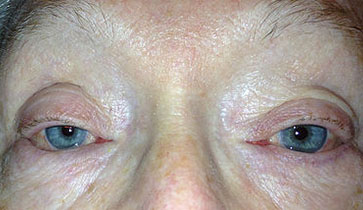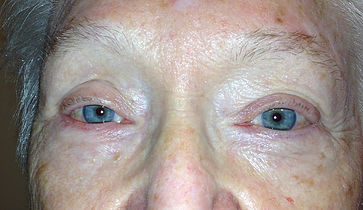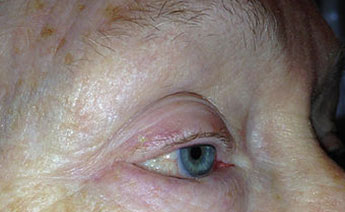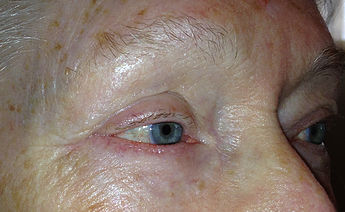Entropion (Turned in lid)
Entropion is a medical condition in which the lower eyelid turns inward.
With age, the skin, muscles and tendons of the lower eyelid can sag and droop. In addition, the fat that surrounds and cushions the eyeball can bulge forward through the skin of the lower lids. As the tendons of the lower lid sag, the lower lid can invert and turn inward with the lashes rubbing the eyeball. This can lead to tearing, mucous discharge (mattering), crusting of the eyelashes and scratching of the cornea.
Repair of lower lid ectropion is done as an outpatient procedure. Frequently this is done in the office with local anesthesia (injection of medicine to numb the area). For patients who desire or need sedation, ectropion repair may be scheduled in an outpatient surgery center where intravenous sedation (also known as conscious or twilight sedation) may be offered. With the area numb, the tendons of the eyelid are usually tightened with sutures through small incisions. The specifics of the procedure are tailored to each patient's needs.
The results of entropion repair depend upon each patient’s symptoms, unique anatomy, appearance goals, and ability to adapt to changes. By correcting this droopiness of the lower lid, the surgery typically improves tearing and mucous discharge as well as the foreign body sensation that is caused by lashes rubbing the eye. Entropion repair does not improve blurred vision caused by problems inside the eye, or by visual loss caused by neurological disease behind the eye.
There are several options for anesthesia to make you comfortable during surgery. Entropion repair is frequently done in the office with just local anesthesia (medicine injected to numb the area). If patients desire some relaxation oral medication can be prescribed which the patient can pick up from his/her pharmacy and take before the procedure. If additional sedation is preferred, your entropion repair may be scheduled at an outpatient surgery center. At a surgery center, intravenous sedation (also known as conscious or twilight sedation) can be offered. Less commonly, or if eyelid surgery is combined with other surgery, you may be given deeper anesthesia that makes you unconscious for the surgery (general anesthesia).



